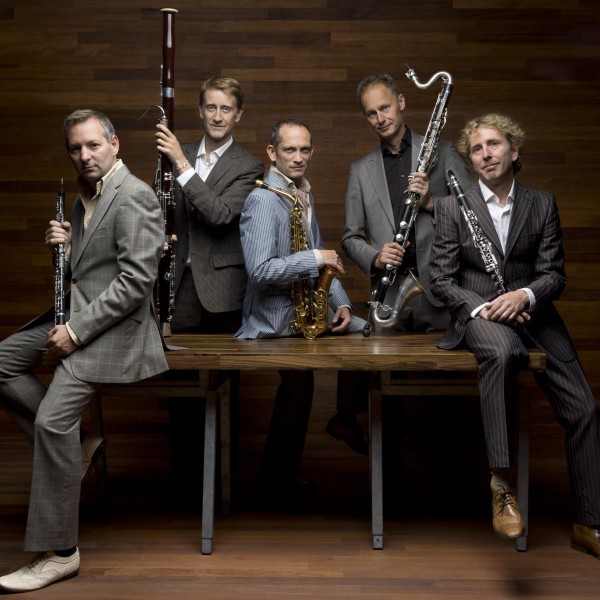From Bach to Shostakovich, the Calefax Reed Quintet makes a case for the art of transcription

The Calefax Reed Quintet performed Tuesday night for the Chamber Music Society of Salt Lake City. Photo: Marco Borggreve
Despite the snowstorm that began Tuesday afternoon, a sizable audience turned out for the evening’s concert by the Chamber Music Society of Salt Lake City in Libby Gardner Concert Hall. Those who braved the elements were rewarded with a captivating concert by the Calefax Reed Quintet.
The Netherlands-based ensemble has an extensive repertoire ranging from the baroque to the 20th century. In their Utah debut, the group dispelled any doubt about their program of woodwind trasncriptions. The five members do all of their own arranging and these versions did full justice to the originals.
The quintet (Oliver Boekhoorn, oboe; Ivar Berix, clarinet; Raaf Hekkema, saxophone; Jelte Althuis, bass clarinet; and Alban Wesly, bassoon) opened their concert with a delightful performance of the Zdenka Variations by Leos Janácek. This early, seldom played piano work doesn’t give an idea of the Czech composer’s mature style, but it’s an attractive light work that flows with romantic sentiment. In their nicely expressive reading the players captured the fluid lines of the theme as well as the lyrical and often jovial character of the variations.
Franck’s Prèlude, Fugue et Variation, originally for organ, followed. The five underscored the rhythmic vitality of the Prèlude with their robust playing, while clarity and clean-cut phrasings to the Fugue that made the different voices distinct. The closing variation was given a lyrical and finely crafted treatment.
After the Franck, the band played a short piece by the bv the blind Chinese composer Abing, who lived from 1893-1950. As Wesly explained before playing it, the group came across the piece on one of their tours to China and fell in love with it and wanted to incorporate it into their repertoire.
Originally written for the erhu, a two-stringed Chinese instrument, the piece works surprisingly well for winds. The sensitive arrangement successfully imitates the flexibility of the original melody with subtle glissandi in each of the five instruments; on tinwhistle and Boekhoorn even managed to recreate the bent tones so common in Chinese music. This wonderfully heartfelt performance full captured the haunting exoticism of the original version.
The first half of the concert ended with three of the Preludes and Fugues, Op. 87, by Shostakovich. The five played this music with clarity of line, finely honed articulation and precise delivery. The selections–oddly, not identified–were nicely varied, moving from jaunty, tongue-in-cheek humor to softly flowing lyricism and the brooding intensity that characterizes much of the Russian composer’s music. They infused their playing with subtle lyricism and nuanced expression.
The entire second half was devoted to J.S. Bach’s Goldberg Variations.
The Calefax Quintet opened the performance in a rather unusual fashion: Berix, Hekkema, Althuis and Wesly entered the stage from the right playing the start of the opening Aria, from which all the variations descend. This was answered by Boekhoorn on oboe d’amore walking in from the left, and as they met upstage in the middle, all five musicians finished the theme facing the audience for a dramatic and effective start.
The five gave a thoughtful and sensitive reading of the work that captured the depth of expression and the intricate counterpoint of the original with consistently imaginative instrumental combinations that added a colorful layer to the music. Throughout the piece, Boekhoorn switched between oboe, oboe d’amore and English horn, Hekkema moved from soprano sax to alto sax and Althuis alternated between bass clarinet and basset horn.
This was a tour de force performance that displayed the band’s versatility, technical mastery and interpretive skills to the fullest. Their compelling and convincing rendering emphasized the fluid lyricism and nuanced dynamics and expressive shadings of Bach’s original. The Calefax made the Goldberg Variations seems notably fresh in this retooling, the music springing to life with their vibrant and magnificent playing.
The Chamber Music Society of Salt Lake City’s next concert takes place 7:30 p.m. February 27, at Libby Gardner Concert Hall. It features the Cuarteto Casals in a program of works by Mozart, Mendelssohn and Beethoven. cmsoflc.org.
